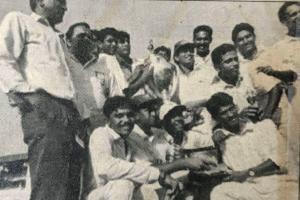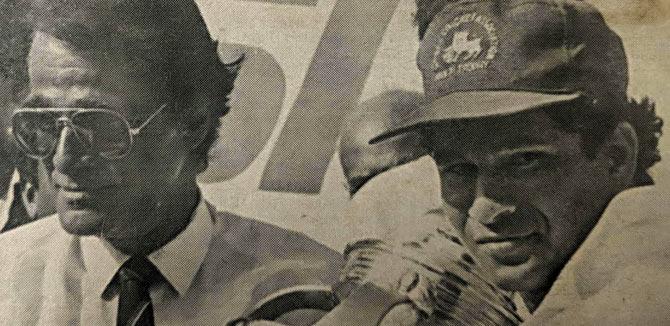Exactly 25 years ago in 1995, batting icon Sachin Tendulkar, then 21, put the finishing touches to his preparations to become the youngest captain to win the Ranji Trophy at the Wankhede Stadium

The Mumbai team which won the Ranji Trophy in the 1994-95 season. Pic/mid-day archives
![]() The curtains came down on the last Ranji Trophy season in an exciting fashion with champions Saurashtra having to fight tooth and nail for first innings honours over Bengal in the final at Rajkot. Though both teams had India Test specialists Cheteshwar Pujara and Wriddhiman Saha, they didn't have all their internationals, who were picked for the ODI series against South Africa. It was different 25 years ago when Sachin Tendulkar's Mumbai were up against Navjot Singh Sidhu's Punjab at the Wankhede Stadium from March 27 to 31, 1995.
The curtains came down on the last Ranji Trophy season in an exciting fashion with champions Saurashtra having to fight tooth and nail for first innings honours over Bengal in the final at Rajkot. Though both teams had India Test specialists Cheteshwar Pujara and Wriddhiman Saha, they didn't have all their internationals, who were picked for the ODI series against South Africa. It was different 25 years ago when Sachin Tendulkar's Mumbai were up against Navjot Singh Sidhu's Punjab at the Wankhede Stadium from March 27 to 31, 1995.
ADVERTISEMENT
Sidhu, Tendulkar, Vinod Kambli and Sanjay Manjrekar were available for the knockouts after returning from the New Zealand Centenary one-day series and hence the Ranji Trophy final had the best possible teams on offer. Mumbai thrived on Tendulkar's presence and his form leading up to the final was daunting to Mumbai's opponents. It started with a Ranji career best score of 175 for which he flayed the Baroda attack at the Rashtriya Chemicals and Fertilizers ground. The next top-scorer was Vinod Kambli, who smashed 55 off 57 balls while Tendulkar took only 81 balls to reach his 100. The game at Chembur, which Mumbai won by five wickets, was a memorable one. Baroda captain Kiran More was unhappy with the umpiring and his hot-headed fast bowler Rashid Patel had plenty to say to the Mumbai players and umpire RC Sharma, apart from throwing down his bat when debutant pacer Bharat Karnik had him caught behind by Sameer Dighe. Karnik made his debut along with 35-year-old pacer Ravi Gadiyar. Mumbai were rather depleted here because Amol Muzumdar, Sairaj Bahutule, Paras Mhambrey and Abey Kuruvilla were on duty for India 'A' against England 'A'.

Sachin Tendulkar with the Ranji Trophy alongside the then Mumbai Cricket Association secretary Bal Mahaddalkar on March 31, 1995. Pic/mid-day archives
When Mhambrey and Kuruvilla returned, they formed a formidable pace trio with Salil Ankola and Mumbai's opponents struggled against some serious pace bowling talent. The trio crushed Tamil Nadu inside three days, dismissing them for 118 on the first morning in 40.1 overs on February 26 with Tendulkar not feeling the need to call on his spinners, Bahutule and Nilesh Kulkarni. The spin duo played their part in helping Mumbai dismiss Tamil Nadu for 190 in the second innings for an entry into the semi-finals against Uttar Pradesh while Punjab clashed with Delhi.
Mumbai brushed aside Uttar Pradesh in another three-day finish, by an innings and 233 runs but at the Kotla, Delhi plundered 554 aided by three figure-efforts from the late Raman Lamba (165) and Ajay Sharma (240). Then, the unbelievable happened. At 298 for six, the men from the capital were licking their lips in anticipation of a Mumbai v Delhi summit clash on their home ground which was always going to be difficult for the then 31-time champions. No way, felt Bhupinder Singh Jr (297) and Pankaj Dharmani (202) who put on 460 for the seventh wicket to help Punjab amass 780 for eight. Delhi were stunned and Punjab arrived in Mumbai with a spring in their step. "We were fearless, on top of our game. We relished the opportunity to play against Mumbai and were determined to prove how good we were," fast bowler Bhupinder Singh Sr told me yesterday.
Sidhu won the toss and put Mumbai in, hoping that Bhupinder, Obaid Kamal and Sandeep Sharma could get some traditional morning juice from the Wankhede pitch. But all they got was the early wicket of opener Manoj Joglekar. Manjrekar and opener Dighe put on 286. Dighe went about paying his "natural, attacking game" on the advice of Tendulkar and clearly his 137 was the best among his then seven hundreds. Tendulkar helped himself to a century (140 in 130 balls) and so did Kambli as Mumbai declared at 690 for six. "At one stage, when Tendulkar was blasting us, we just decided to enjoy the battering," revealed Bhupinder Sr.
Punjab hoped for another recovery partnership when they were 99 for two and got in the form of a 218-run alliance between Vikram Rathour (current India batting coach) and Sidhu. But towards the end of the third day, Bahutule got the Punjab captain caught behind by Dighe while Rathour went on to make 177. Amol Muzumdar remembered diving to take a catch inches off the ground which dismissed Rathour.
The rest of the Punjab batting collapsed with only two batsmen getting to double figures. Their batting order didn't include Bhupinder Singh Jr (who scored that 297 against Delhi) since he suffered an injury while facing Javagal Srinath in the Challenger Trophy held in between the Ranji Trophy semi-finals and final.
Also missing was ex-Test man Gursharan Singh. Gursharan told me in an interview on the fourth day that he didn't know why he was excluded. He was probably more embarrassed when the great Lala Amarnath (who was in Mumbai to receive the first CK Nayudu Lifetime Achievement award from the BCCI) told him on Day One that he should get a double century in the final, only to be informed that he was not in the playing XI in the best interests of the team.
Tendulkar didn't enforce the follow on after Punjab were dismissed for 372 and I remember Rathour telling Ankola near the Wankhede Stadium dressing room area that he couldn't believe that Mumbai were batting again. Tendulkar scored his second hundred of the match before Bahutule became the fifth centurion for Mumbai in the final. Mumbai's 513-6 declared meant Punjab had a unreal victory target of 832. They ended up with 141-2.
Daljit Singh, who became BCCI's chief curator, was Punjab's coach and he told me on Wednesday that though Mumbai were on top for most of that game, it was a very lively, jovial dressing room under Sidhu's captaincy. "I remember Kambli coming to our dressing room one evening and expressing surprise over all the laughter from the team that were getting beaten while the Mumbai camp was quiet," said Daljit.
Mumbai were assisted in no small measure by their bowling attack. Former Test Ramakant Desai, who managed the team, hailed the pack of Ankola (19 wkts in four games), Mhambrey (27 in six), Kuruvilla (16 in five), Kulkarni (31 in seven) and Bahutule (9 in four). "All credit to the team but most importantly, we had a good set of bowlers to bowl out the opposition for low totals," the late Desai told me after the game.
The match included present stars and future India players like Rathour, Dharmani, Dighe, Bahutule, Kuruvilla, Kulkarni and Mhambrey. It also featured India's next captain - Tendulkar. He led Mumbai with aplomb and as Wisden of 1996 noted, he scored 856 runs off just 859 balls with 23 sixes and 106 fours.
For him and his side, the curtains which came down for that Ranji Trophy season were laced with gold.
mid-day's group sports editor Clayton Murzello is a purist with an open stance. He tweets @ClaytonMurzelloSend your feedback to [email protected]
The views expressed in this column are the individual's and don't represent those of the paper
Catch up on all the latest Crime, National, International and Hatke news here. Also download the new mid-day Android and iOS apps to get latest updates
 Subscribe today by clicking the link and stay updated with the latest news!" Click here!
Subscribe today by clicking the link and stay updated with the latest news!" Click here!






